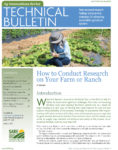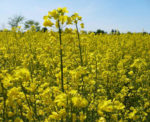Showing 41-50 of 136 results

Our Farms, Our Future Podcast Series
The Our Farms, Our Future podcast series brings together the sustainable agriculture community for thought-provoking conversations about the state of agriculture, how we got here, and where we're headed.

How to Conduct Research on Your Farm or Ranch
This 32-page bulletin outlines how to conduct research at the farm level, offering practical tips for both crop and livestock producers, as well as a comprehensive list of more in-depth resources.

SARE Brochure
A free-to-order catalog/brochure that includes information about SARE, our grant programs, and our printed and online resources.

Sustainable Production and Use of On-Farm Energy
Using solar or wind energy or producing biofuels from crop feedstocks and anaerobic digestion helps farmers achieve energy independence while improving profitability and reducing fossil fuel emissions.

2017 National Conference on Cover Crops and Soil Health
Session recordings are available from the second National Conference on Cover Crops and Soil Health. The event served as an opportunity to learn recent developments in how cover crops are being used by innovative farmers across the country and gain important insights on improving soil health from producers, conservation leaders and scientists. It was held December 7-8, 2017 in Indianapolis.

Recordings of General Sessions
Opening remarks by Jane Hardisty (USDA-NRCS Indiana) with video message Bill Northey (Iowa Secretary of Agriculture) Keynote: Growing a Revolution - Bringing Our Soil Back to Life, by David Montgomery (University of Washington) Farmer panel: Experiences with Cover Crops and Soil Health, with Dan DeSutter (Ind.), Trey Hill (Md.) and Jimmy Emmons (Okla.) Top 10 Ways Cover Crops Build Soil Health, by Rob Myers (North Central SARE) Plenary session: Carbonomics, by Keith Berns (Neb. farmer and Green Cover Seed)

Basics of Cover Cropping
Introduction to Cover Crops Selecting and Establishing Cover Crops Terminating Cover Crops Plus Strategies for Planting a Cash Crop Following Cover Crops

Advanced Cover Cropping Insights from Farmer Experts
Great Plains Perspective Central Corn Belt Perspective Eastern Perspective

Digging into Soil Health
Soil Health Principles Soil Health Testing and Practices Soil Biology and Organic Matter

Cover Crop Role in the Cropping System
Cover Crops and Nutrient Management Cover Crop Impacts on Diseases and Insects Cover Crops, Herbicides and Dealing with Herbicide-Resistant Weeds